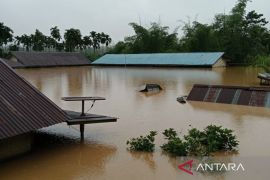Data from the COVID-19 Task Force shows that the daily positive confirmed cases of COVID-19 in July–August 2021 reached more than 50 thousand, marking the highest daily infections in Indonesia since the outbreak began.
The highest daily deaths were recorded at more than two thousand in August 2021, which also marked the peak of fatalities from COVID-19.
Meanwhile, the highest recoveries reached nearly 50 thousand per day in August 2021, indicating the success of the government's efforts to handle confirmed infections.
Combined data on daily cases, deaths, and recoveries shows that the months of July and August proved the most challenging for the government in its efforts to deal with COVID-19 this year.
Meanwhile, based on provincial case reports, Jakarta reported the highest number of cases at more than 800 thousand, followed by East Java with more than 600 thousand cases, Banten with more than 400 thousand cases, and South Sulawesi 400 thousand cases.
Based on gender, 51.3 percent of citizens who were confirmed positive for COVID-19 were women. However, most patients who died of COVID-19 were males (52.3 percent).
Based on the age group, the highest number of infections were reported in the 34–45 age group. However, the highest deaths were seen in people aged over 60.
The Delta variant of the coronavirus was believed to be the main cause behind the highest daily increase in cases in July–August 2021.
At a press conference on July 5, 2021, Coordinating Minister for Maritime Affairs and Investment, Luhut Binsar Pandjaitan, had said that 90 percent of COVID-19 transmissions in Jakarta were caused by the Delta variant.
This was confirmed by the spokesperson for COVID-19 vaccinations for the Health Ministry, Dr. Siti Nadia Tarmizi, who appealed to the public to be wary of the Delta variant.
"Currently, the Delta variant is the dominant variant in Indonesia," said Tarmizi in a press release on the Implementation of Community Activity Restrictions (PPKM) issued here on August 25, 2021.
The Delta variant, she said, is one of the variants of the coronavirus that has a high transmission rate and has the potential to cause severe infection.
In Indonesia, the emergence of the Delta variant marked the start of the second wave of virus mutations that caused a spike in COVID-19 cases in the country, she added.
"So, that wave is actually a mutation. The first wave is the initial wave, the original case from Wuhan, then the second wave is the Delta variant wave that attacked many (people). And, now we are entering the Omicron wave (variant)," said public health expert, Prof. Hasbullah Thabrany, here on Tuesday.
Related news: First local transmission of Omicron confirmed in Indonesia
Related news: First patient of local Omicron transmission is asymptomatic: Ministry
Handling efforts
Various efforts have been made by the Indonesian government to deal with the COVID-19 pandemic, ranging from enforcing health protocols (such as washing hands, wearing masks, and maintaining distance, or the 3Ms) to efforts to increase testing, tracing, and treatment (3T), and efforts to accelerate vaccinations for 208,265,720 Indonesians to build herd immunity.
Besides enforcing health protocols, the government also enforced restrictions on community activities to limit the movement of people to stem the spread of the virus.
All these efforts were carried out by the government and other related parties to end the COVID-19 pandemic in Indonesia.
And, all these efforts have paid off.
This can be seen from the decline in daily COVID-19 cases in Indonesia compared to their peak in July–August 2021.
As per data provided by the COVID-19 Handling Task Force, the number of daily cases has continued to fall to reach 120, while active cases have dropped to around 159 per day, while recoveries have continued to increase to around 271. Meanwhile, 110.8 million residents have received a full dose of the COVID-19 vaccine.
However, Thabrany urged the government to not stop increasing handling efforts. Apart from the government's hard work in handling COVID-19, the decline in daily cases is also partly due to unexpected luck, he remarked.
"I call it unexpected luck as there could have been so many asymptomatic cases that went undetected, but then it gave rise to natural immunity," he elaborated.
"So, there is a combination of natural immunity and our success in carrying out health protocols, vaccinations, and other efforts," he said.
Thabrany then asked the government to accelerate COVID-19 vaccinations, especially amid the threat of the spread of the Omicron variant in Indonesia.
"We have to be more aggressive in vaccinations since the government's vaccination target is for around 208 million people by the end of this year. So, there must be more aggressive efforts so that the vaccination reaches the entire population," he said.
Anticipating the third wave
In an effort to anticipate the surge in COVID-19 cases marked by the third wave of mutations of the Omicron variant, the Indonesian government has adopted four strategies, said Health Minister Budi Gunadi Sadikin.
The strategies include continued enforcement of the health protocols in the community, increased surveillance, acceleration of vaccinations, and also strengthening of care services for COVID-19 patients.
"The Health Ministry is consistently implementing four strategies for handling Omicron. The first is health protocols, the second is surveillance, the third is vaccination, the fourth is treatment," he said at a press conference on COVID-19 response, which was broadcast via the Presidential Secretariat's YouTube channel on Monday morning.
The minister reminded the people to use the PeduliLindungi application, which has been developed to support the tracing of COVID-19 transmission.
He also appealed to the public to not travel abroad if not urgent, saying the transmission of the Omicron variant started from abroad.
Besides enforcing health protocols and tightening travel rules, the government is also monitoring cases by carrying out testing, tracing, and handling coronavirus cases, the minister said.
The ministry is using the RT-PCR method to identify S-gene target failure (SGTF) for detecting Omicron transmission, he informed.
All prevention efforts are being carried out by the government to prevent transmission of the Omicron variant in the community, he assured.
Hence, the community should obey the rules so that the spread of COVID-19 cases can be controlled together, he added.
Related news: Epidemiologist upbeat about Indonesia reaching endemic stage by 2022
Related news: Controlling comorbid diseases key to reach endemic phase: task force
Editor: Sri Haryati
Copyright © ANTARA 2021












